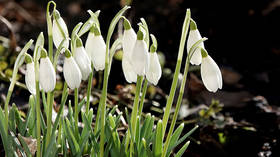Moscow's winter WARMEST in 140 years of records: Normally FRIGID Russian capital's temperature averages ABOVE zero

As the world’s largest country, Russia is clearly a bellwether for the effects of climate change. If this winter is anything to go by, the signs are ominous when it comes to controlling global heating.
For the first time since records began, Moscow’s average winter temperature was above zero degrees. Meanwhile, the winter weather in the region surrounding the capital was similar to that of Berlin, Prague, Bratislava, Sofia and Vienna, and more characteristic for towns and cities in the south of the country, with averages an astonishing 7.7 degrees above normal.
Also on rt.com Climate change in Russia: Moscow temperatures exceeded norms by 9.2 degrees Celsius in JanuaryGlobal warming took its toll on Russia across 2019. The summer months saw vast swathes of Siberia engulfed in wildfires and, in December 2019, President Vladimir Putin spoke of the risks of climate change for Russian cities within the Arctic Circle. Now the climate crisis has shown no signs of slowing down in 2020.
The winter of 2019-20 exceeded all records, beating the previous hottest period 59 years ago, according to a report by weather center Fobos.
“In the capital city, the average seasonal temperature exceeded the norm by 7.7 degrees. Moscow, which is [usually] the third coldest capital city in the world, had a positive average winter air temperature of +0.5 degrees,” Fobos wrote. It added that the warm winter will likely be followed by an even warmer March, and snow cover should “completely disappear” by March 5th.
Roman Vilfand, Scientific Director of the Hydrometeorological Center of Russia, cited slightly different figures. He told the TASS News Agency that the average winter temperature in Moscow was 2.5 degrees warmer than the previous record of -2.8, set in winter 1960-61.
“I am sure that we are not going to see such a warm winter again for a long time,” he said.
He also suggested that the weather in the first week of March will be warm, estimating it to be between 6-9 degrees higher than normal.
It seems, however, that the abnormally warm winter will not turn into a scorching summer. An employee of the Main Geographic Observatory, Andrei Kiselev, said that the summer in the city will be moderate, citing historical data which shows that an unusually warm winter is typically followed by a moderately warm summer.
While the rise in temperatures around the world is having devastating effects on nature, there's a silver lining for some people. Due to the abnormally warm winter, the cost of heating will be revised, and many Russians will get some of their money back, according to the newspaper Izvestia. Residents of regions in which payments are charged evenly throughout the year, rather than measured by meters, will see an unexpected boost in their disposable income.
Earlier this year, former Prime Minister Dmitry Medvedev approved a national plan for adapting to climate change.
Like this story? Share it with a friend!













